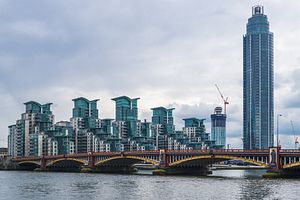When it comes to Western involvement in questionable or corrupt commercial practices with Central Asia, much of the discussion over the past few months has been focused on capital and connections out of Kazakhstan and Uzbekistan. Between the massive telecom bribery scandal engulfing the daughter of Uzbekistan’s president, to the multiple connections made to Kazakhstani President Nursultan Nazarbayev’s family via the Panama Papers leak, to new details surrounding Buckingham Palace’s suspicious fiscal relationship with those close to Nazarbayev, Astana and Tashkent have coopted much of the news on Central Asian funds shuffled outside the region.
A new round of investigations, however, have shown that Kazakhstan and Uzbekistan are by no means the only Central Asian states whose elites continue taking advantage of Western financial opportunities. As The Guardian found last week, some two-thirds of the homes in the Tower, London’s tallest residential skyscraper, are owned by individuals of foreign origin. All told, approximately one quarter of these homes are “held through secretive offshore companies based in tax havens” – much like those front companies unveiled in the recent Panama Papers fracas.
Among the former Russian politicians and Kurdish oil scions, investigators discovered one owner tied back to Central Asia: former Kyrgyz MP Sharshenbek Abdykerimov, best known for running the Ayu vodka brand. While Abdykerimov is not directly linked to Kyrgyzstan’s first family – unlike the revelations circling the regimes in Uzbekistan and Kazakhstan – he nonetheless maintains an outsized presence within Bishkek’s commercial-cum-political circles, such that he was recently tabbed as the chairman of Kyrgyzstan’s Olympic committee. Indeed, some in the West may well be familiar with Abdykerimov; a few years ago, his company hired U.S. rapper Chingy to plug its Shpilka vodka, apparently attempting to access an American generation that was raised on early-to-mid-2000s hip-hop.
To be fair, parking one’s funds in a London skyrise – alongside an Egyptian snack-food tycoon and Indonesian banker, among the others The Guardian discovered – is not, in and of itself, illegal, or an indication of illicitly greased palms. However, the news fits with something of a pattern surrounding Abdykerimov. A 2014 investigation from EurasiaNet discovered that Kyrgyzstan’s government was “missing out on much-needed revenue” on account of “trade in fake excise stamps” within the country’s vodka trade. The report noted that in 2013 “a state anti-corruption squad reportedly found 100,000 bottles of vodka bearing fake excise stamps in an Ayu warehouse.” Charges, however, were dropped, and Ayu representatives “refused to speak” when contacted. (In the interest of full disclosure, I work as a social media editor at EurasiaNet.)
Abdykerimov has gone through the motions of cultivating a favorable domestic opinion, with hagiographic local coverage comparing him to John D. Rockefeller. Unlike counterparts in Kazakhstan or Uzbekistan, however, Kyrgyzstan’s punchy media has made sure to highlight Abdykerimov’s heretofore-concealed ownership of a posh London flat. A representative of Ayu told Azattyk that Abdykerimov purchased the flat five to six years ago, and denied any issues of corruption.
The news, of course, will do little to stanch London’s reputation as a haven for foreign funds, nor will it help bruised relations between the UK and Kyrgyzstan. For the past few years, London has hosted the son of former President Kurmanbek Bakiyev, toppled in Kyrgyzstan’s 2010 revolution. Maxim Bakiyev remains one of the most loathed figures within Kyrgyzstan–a reputation due in no small part to his propensity for enshrining, and profiting from, mechanisms of corruption–but has settled himself in the UK, and morphed into a notable point of contention between Bishkek and London. Halfhearted U.S. attempts to extradite Maxim Bakiyev fizzled out in 2013 and, like his father in Belarus, there appears little likelihood Maxim will return to Kyrgyzstan for the foreseeable future.
As President Almazbek Atambayev told The Guardian in 2013, Britain is “hosting a guy who robbed us. … I spent 20 years in opposition and have always fought for democracy but I didn’t know that behind the beautiful words of democracy are very dirty lies.”
Now, with the latest revelations, London can chalk up another Kyrgyz oligarch in it stead – and Bishkek can keep pace with the other Central Asian moneyed classes storing their funds in a welcoming West.

































